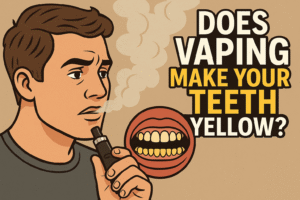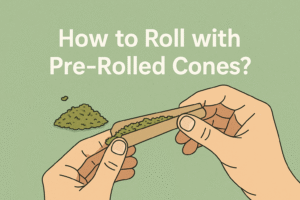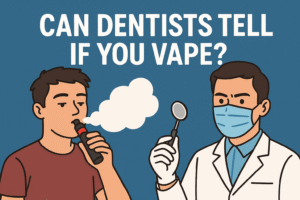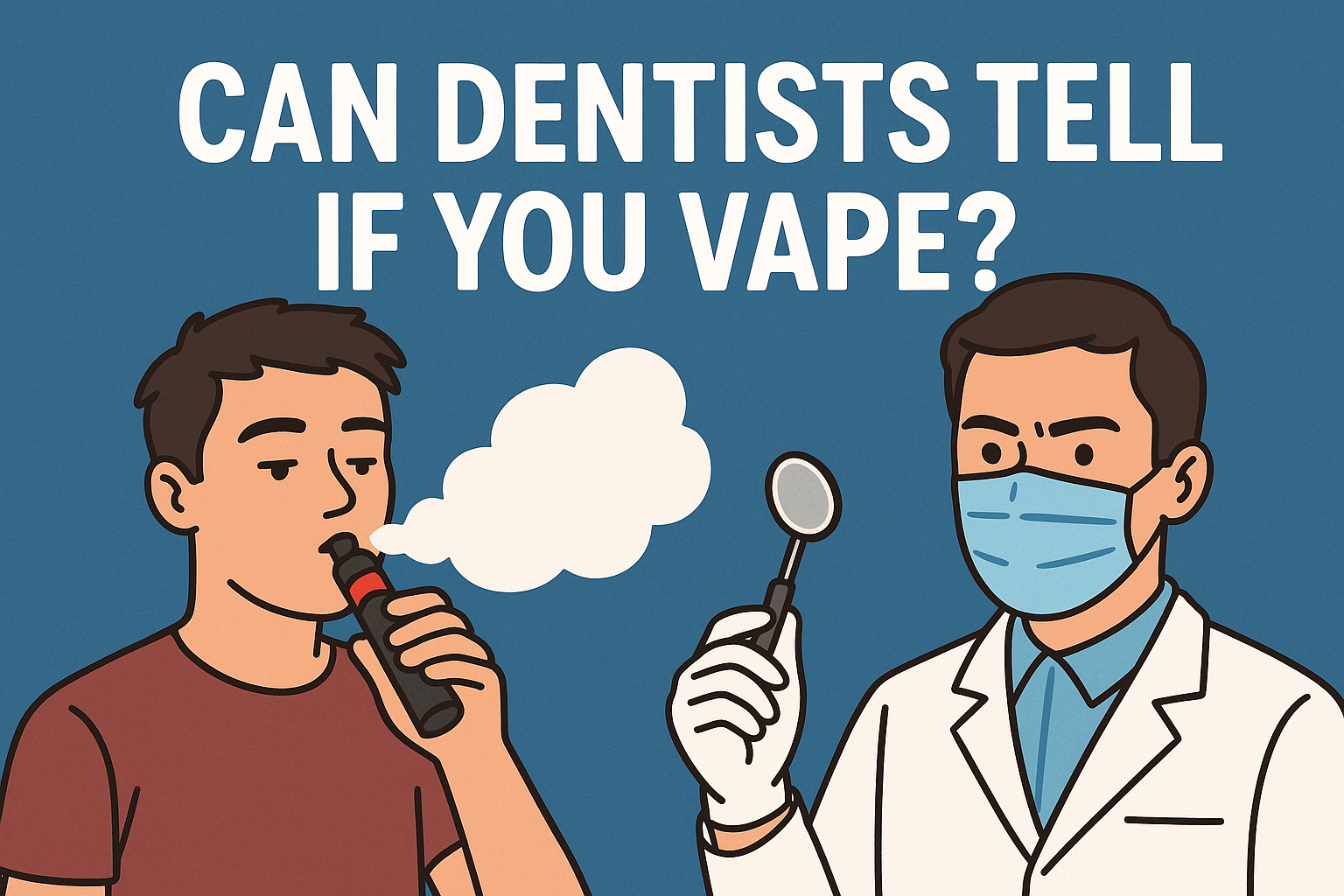
You sit in the dentist’s chair, open your mouth, and suddenly a thought hits you: “Can dentists tell if you vape?” It’s the most common questions many people ask, often with a mix of curiosity and worry.
The truth is, vaping doesn’t hide as well as you think. Even without the heavy smoke and tar of cigarettes, dentists can usually tell if you vape. The changes in your teeth, gums, and breath give it away. They’re trained in a manner that things invisible to you are often clear to them.
According to the American Dental Association (ADA), vaping dries out the mouth, weakens gums, and increases the risk of tooth decay. These are the reasons why dentist pays close attention to your mouth. His aim is not to judge you, but to catch early signs so he can protect your sweet smile.
In this article, we’ll break down exactly how dentists detect vaping, the science behind it, and what you can do to minimize the harm.
Can Dentists Really Tell If You Vape?
Yes — dentists can tell if you vape. Even though vaping doesn’t create thick smoke or the same heavy tar stains as cigarettes, it leaves behind changes in your mouth that are hard to miss during an exam.
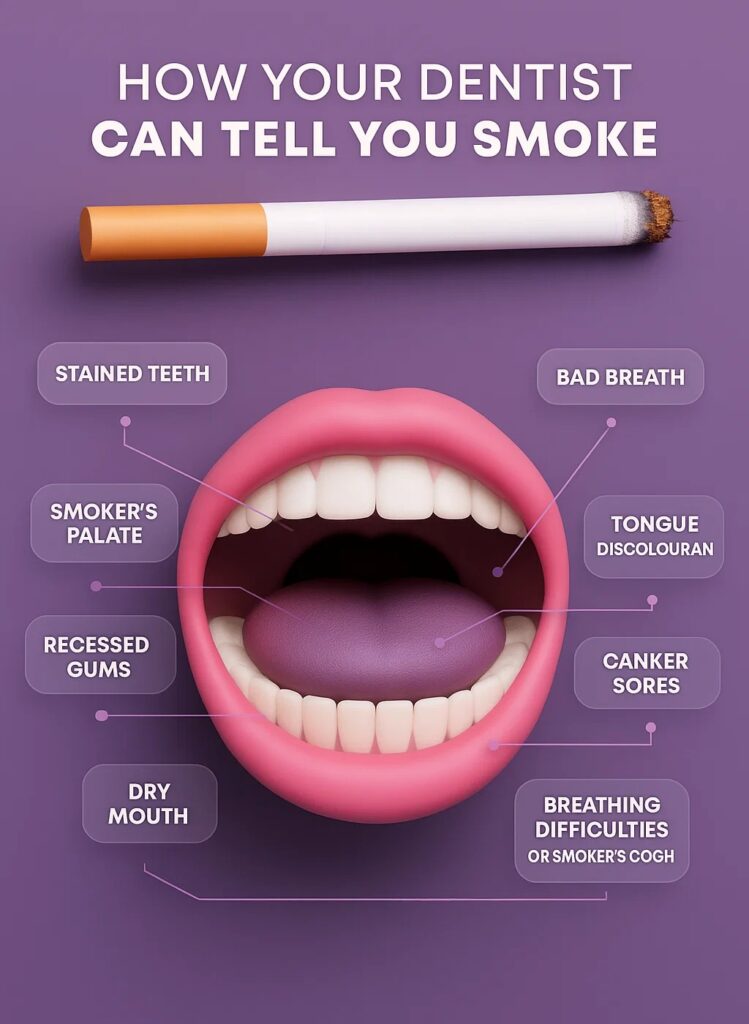
Dentists are trained to look beyond cavities and plaque. They study the overall health of your mouth — the shade of your teeth, the condition of your gums, the level of moisture, and even the scent of your breath. Vaping impacts each of these areas:
- Teeth: Nicotine is responsible for causing yellow or brown staining over time.
- Gums: Restricted blood flow from nicotine leads to swelling, redness, or early gum recession.
- Saliva: Vape chemicals reduce saliva, leaving the mouth dry — a condition that raises cavity risk.
- Breath: Most flavored e-liquids can leave a bad smell and cause bad breath.
A 2018 study in the Journal of the American Dental Association found that gum inflammation and oral dryness are higher in regular e-cigarette users as compared to non-smokers. These changes may not be visible to you, but they are clear to a dentist who examines mouths every day.
How Can Dentists Tell If You Vape?
Dentists don’t need to ask directly if you vape — your mouth often reveals the answer. Here are the most common signs they notice:
| Sign | Vapers | Non-Vapers |
|---|---|---|
| Tooth Color | Yellow/brown staining from nicotine | Natural white/light staining over years |
| Saliva Flow | Reduced → dry mouth | Normal → keeps teeth protected |
| Gums | Red, inflamed, early recession | Pink, firm, healthier |
| Breath | Sweet/chemical odor, persistent bad breath | Fresher, neutral breath |
| Plaque/Cavities | Higher risk due to sweetened vape juices | Natural white/light staining over the years |
1. Tooth Staining and Discoloration:
- Nicotine present in e-liquids causes teeth to turn yellow or brown.
- These stains appear near the gum line or between teeth, where your brush can’t reach directly.
- The discoloration becomes harder to remove with normal cleaning over time.
“According to the American Dental Association (ADA), nicotine exposure is one of the leading causes of dental staining, even without cigarette smoke.”
2. Dry Mouth (Xerostomia)
- Chemicals present in vapes reduce saliva production.
- Saliva protects your teeth by washing away food particles and bacteria.
- A dry mouth in the absence of saliva creates the perfect environment for plaque, cavities, and bad breath.
A Clinical Oral Investigation research found that e-cigarette users reported significantly higher rates of dry mouth than non-users.
3. Gum Inflammation and Recession
- Nicotine reduces blood flow to the gum tissues.
- This makes gums weaker, slower to heal, and more likely to pull away from teeth (recession).
- Dentists may also notice red, swollen gums or early signs of periodontal disease.
4. Bad Breath (Halitosis)
- Vaping often leaves behind a sweet, chemical, or burnt odor.
- Combined with dry mouth, this leads to a persistent smell that dentists notice quickly.
5. Oral Lesions and Irritation
- Vaping can cause ulcers, white patches, or irritation on the tongue and inner cheeks.
- In some cases, dentists detect conditions like oral thrush (yeast infection) linked to dry mouth and chemical exposure.
6. Faster Plaque and Decay
- Flavored vape juices often contain sweeteners.
- These stick to teeth and act as food for bacteria, speeding up plaque buildup.
- Dentists may see cavities forming faster than in non-vapers.
👉 In short: Stains, dryness, gum issues, bad breath, and unusual oral irritation are all red flags dentists look for. You may think you’ve hidden your vaping habit, but these patterns are very clear to a professional.
How Quickly Can Dentists Notice if You Vape?
Many people think it takes years for vaping to affect their mouth. But the truth is, vaping signs can appear within weeks or months, and dentists can quickly spot them.
| Timeframe | Changes in the Mouth |
|---|---|
| Weeks–Months | Dry mouth, bad breath, mild staining |
| 3–12 Months | Gum inflammation, early lesions, plaque buildup |
| 1+ Year | Gum recession, deeper staining, higher cavity risk |
1. Short-Term Changes (Weeks to Months)
- Dry mouth can show up almost immediately after regular vaping.
- Bad breath often develops within a few weeks as saliva decreases.
- Mild staining may appear early, especially if you vape frequently or use high-nicotine liquids.
2. Medium-Term Changes (3–12 Months)
- Gum inflammation becomes noticeable — redness, swelling, or tenderness.
- Dentists may also spot early plaque buildup caused by sweetened vape juices.
- Small lesions or irritations inside the mouth may begin to show.
3. Long-Term Changes (1 Year and Beyond)
- Gum recession starts to become obvious.
- Tooth discoloration deepens, making whitening treatments less effective.
- The risk of decay, infection, or periodontal disease becomes higher.
Dentists don’t need years of evidence to find out whether you vape or not. Even if you’ve only been vaping for a short time, changes in your gums, teeth, and breath are enough for them.
Does the Type of Vape Matter?
Yes, the type of vape you use plays a big role in your oral health and how your dentist can detect your vaping habits. Different vape juices have different flavors and nicotine levels. Dentists may not always know the exact type of vape you use, but the signs like staining, dryness, or gum irritation can point to what kind of product is behind the changes.
| Type of Vape | Impact on Teeth & Gums | What Dentists See |
|---|---|---|
| Nicotine Vapes | Causes staining, dry mouth, gum irritation | Yellow teeth, receding gums |
| Nicotine-Free Vapes | Still irritates oral tissues, lowers saliva | Dry tissues, oral irritation |
| Flavored/Sweetened Vapes | Sugars feed bacteria → more plaque & cavities | Cavities between teeth, sticky buildup |
| Cannabis Vapes | THC causes severe dry mouth, bacterial imbalance | Very dry tongue/gums, odor |
| Nicotine Salts (High Strength) | Stronger gum restriction, faster staining | Early gum disease, poor healing |
A 2021 study in Frontiers in Oral Health found that flavored and high-nicotine vapes significantly changed the oral microbiome, leading to faster gum irritation and plaque buildup.
Whether it’s nicotine, flavor, or carts, everything its own footprint on your oral health. Dentists may not ask what kind of vape you use, but the oral health changes often reveal the answer.
What Does the Scientific Evidence & Expert Opinions Say?
Dentists don’t just rely on what they see. There’s a science-backed connection between vaping and oral health problems. Several studies and professional organizations have examined how e-cigarettes affect teeth and gums, and the findings are clear: vaping is not harmless.
1. Gum Health and Inflammation
- A study in the Journal of Periodontology found that e-cigarette users had higher levels of gum inflammation compared to non-smokers.
- Nicotine and other chemicals reduce blood flow, making gums weaker and slower to heal.
2. Dry Mouth and Saliva Reduction
- The American Dental Association (ADA) warns that vaping reduces saliva, which is essential for protecting teeth from cavities.
- Absence of saliva = more bacteria + faster plaque buildup + bad breath.
3. Staining and Discoloration
- Research published in Clinical Oral Investigations showed that e-cigarette vapor caused visible staining on tooth enamel, even without tar.
- Nicotine attaches to enamel and dentin, creating yellow or brown spots over time.
4. Oral Microbiome Disruption
- A 2021 study in Frontiers in Oral Health reported that vaping alters the balance of bacteria in the mouth.
- This shift increases the risk of gum disease, decay, and oral infections like thrush.
5. Long-Term Safety Still Unknown
- The Centers for Disease Control and Prevention (CDC) states that while vaping may expose users to fewer chemicals than smoking, it is not safe for oral tissues.
- Long-term risks, including oral cancer links, are still being studied, but early evidence points toward DNA damage in gum cells.
The science lines up with what dentists see daily. Vaping affects your saliva, gums, enamel, and oral bacteria — all of which leave noticeable signs during a dental exam.
Common Myths About Hiding Vaping from Dentists
A lot of people think they can outsmart their dentist by covering up signs of vaping. These hacks might help for a short time, but they can’t hide the changes in your mouth for a long time. Here are the most common myths — and why they don’t work.
1. “If I Brush Right Before My Appointment, They Won’t Know.”
- Brushing can remove surface residue, but it doesn’t hide gum inflammation, dry mouth, or deeper staining.
- Dentists examine your gums and oral tissues along with the surface of your teeth.
2. “Mouthwash Will Cover It Up.”
- Mouthwash may freshen breath temporarily, but the underlying chemical odor from vape juices and dryness remains.
- Alcohol-based rinses can even make dryness worse, which is another red flag.
3. “Whitening Strips Erase the Signs.”
- Whitening strips only lightened the surface stains, but they don’t stop nicotine from discoloring enamel again.
- They also do nothing for irritated gums or lesions caused by vaping.
4. “Dentists Can’t Smell Vape Like Cigarette Smoke.”
- While it’s true vaping doesn’t have the same strong odor, flavored and chemical smells often linger on the breath.
- Combined with dryness, this creates a noticeable pattern that dentists recognize.
5. “If I Only Vape Occasionally, They Won’t Notice.”
- Even occasional vaping can cause dry mouth and mild staining.
- Dentists see patients every 6 months, so even small changes become obvious over time.
| Myth | Reality |
|---|---|
| “Brushing before a visit hides it.” | Gum issues, dryness, and deep stains still show. |
| “Mouthwash covers it up.” | Only masks odor temporarily, doesn’t fix damage. |
| “Whitening strips erase the signs.” | Surface stains may fade, but gum disease remains. |
| “Dentists can’t smell vape.” | Sweet/chemical odors are still noticeable. |
| “Occasional vaping won’t show.” | Even small changes add up and dentists notice over time. |
Reality check: Quick hacks may hide surface signs for a few hours, but they can’t hide the long lasting effects vaping has on your gums, enamel, and oral tissues. Dentists are already trained to catch these patterns.
Why It’s Important to Be Honest With Your Dentist?
Many people worry that their dentist will judge them if they admit to vaping. In reality, dentists aren’t there to criticize you — their main goal is to protect your oral health. Being honest gives them the full picture so they can provide the right care.
1. Better Diagnosis
If your dentist knows you vape, they’ll pay closer attention to gum health, dryness, and cavities. This helps them catch problems earlier before they turn serious.
2. Tailored Preventive Care
- They may recommend fluoride treatments to strengthen enamel.
- Alcohol-free mouthwash to ease dryness.
- Professional cleaning to manage staining.
- Gum health checks more often to prevent disease.
3. Faster Healing
If you need dental work, vaping can slow down healing. By knowing your habits, your dentist can adjust treatment plans and give you better aftercare instructions.
4. Support for Quitting (If You Want It)
Your dentist can connect you with resources or advice if you decide to cut back or quit. They see the damage firsthand and can help you prevent long-term complications.
Honesty with your dentist isn’t about getting in trouble. It’s about making sure you get the care your teeth and gums actually need. The more open you are, the better they can protect your smile.
How to Reduce the Impact of Vaping on Your Teeth?
Vaping doesn’t mean your oral health is doomed. Some daily habits and regular dental care can help limit the damage. Here’s what works best:
1. Stay Hydrated
- Drink water throughout the day to fight dry mouth.
- Chew sugar-free gum to stimulate saliva production.
2. Use the Right Mouthwash
- Choose alcohol-free, fluoride-based mouthwash.
- This helps protect enamel and avoids making dryness worse.
3. Brush and Floss Consistently
- Brush at least twice a day with fluoride toothpaste.
- Floss daily to remove sticky residue left behind by sweet vape juices.
4. Limit Flavored and Sweet Juices
- Many e-liquids contain sugars that fuel bacteria and cause cavities.
- Using less sugary options can help reduce plaque buildup.
5. Schedule Regular Cleanings
- See your dentist every 6 months — or more often if recommended.
- Professional cleanings remove stains and plaque you can’t reach at home.
6. Consider Preventive Treatments
- Fluoride varnish, sealants, or prescription-strength toothpaste can strengthen enamel.
- Ask your dentist if you’re at high risk for cavities or gum disease.
7. Think About Quitting or Cutting Back
- The best way to protect your smile long-term is to stop or reduce vaping.
- Your dentist can guide you toward helpful resources if you’re ready.
Vaping will affect your mouth anyhow, but with consistent care and professional support, you can slow down the damage and protect your teeth and gums.
Conclusion
So, can dentists tell if you vape? The answer is yes — they can. Yellowing teeth, dry mouth, irritated gums, bad breath, and plaque buildup are all red flags that dentists are trained to notice. The real issue isn’t about whether you can “hide” vaping. It’s about how vaping impacts your oral health.
Your dentist isn’t there to judge you. They simply want the full picture so they can give you the best care. By being open and honest, you’ll get better protection for your teeth and gums — whether that means preventive treatments, cleanings, or guidance if you want to cut back.
Frequently Asked Questions (FAQs)
1. Can dentists smell vape on my breath?
Yes. Combined with dry mouth, vaping creates a noticeable smell that dentists can detect.
2. If I vape only occasionally, will my dentist still know?
Possibly. Even light or occasional vaping can reduce saliva and cause mild staining. Dentists see your mouth every 6 months, so small changes add up over time and become more obvious.
3. Do whitening treatments remove vape stains?
Whitening treatments can help with surface stains, but they don’t stop nicotine from causing new discoloration. Stains also tend to return quickly if vaping continues.
4. Is vaping less harmful to teeth than smoking?
Yes and no. Vaping avoids tar, which causes deep stains and a higher cancer risk. However, it still leads to dryness, gum irritation, and cavities
5. Can dentists tell the difference between smoking and vaping?
Often, yes.
– Smoking usually leaves heavy tar stains and a strong smell.
– Vaping leaves lighter staining, gum irritation, and a sweeter or chemical odor.
– Dentists may ask follow-up questions to confirm which habit is behind the signs.

